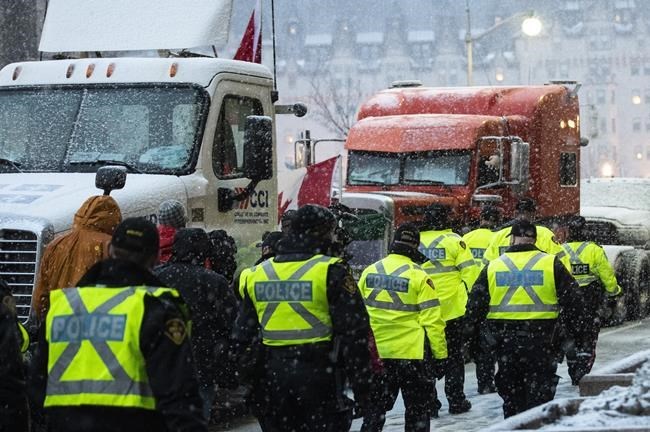OTTAWA — A judge has ruled it was unreasonable for the Liberal government to use the Emergencies Act to quell "Freedom Convoy" protests in the national capital and at key border points two years ago.
In a decision released Tuesday, Federal Court Justice Richard Mosley said invocation of the act led to the infringement of constitutional rights.
The Canadian Civil Liberties Association and several other groups and individuals had argued in court that Ottawa ushered in the emergency measures without sound statutory grounds.
The government contended the steps taken to deal with the pan-Canadian turmoil were targeted, proportional, time-limited and compliant with the Charter of Rights and Freedoms.
The Public Order Emergency Commission, which carries out a mandatory review after invocation of the Emergencies Act, found the government met the very high legal standard for using the law.
Mosley heard arguments in court over three days last April.
In his ruling, Mosley said he revisited the events with the benefit of hindsight and a more extensive record of the facts and the law than the government had when it proclaimed a public order emergency.
"I have concluded that the decision to issue the proclamation does not bear the hallmarks of reasonableness — justification, transparency and intelligibility — and was not justified in relation to the relevant factual and legal constraints that were required to be taken into consideration," Mosley wrote.
Deputy Prime Minister Chrystia Freeland said the government respectfully disagrees with the decision and will appeal it.
"I would just like to take a moment to remind Canadians of how serious the situation was in our country when we took that decision," she told reporters.
In early February 2022, downtown Ottawa was filled with protesters, many in large trucks that rolled into the city beginning in late January.
Ostensibly a demonstration against COVID-19 health restrictions, the gathering attracted people with a variety of grievances against Prime Minister Justin Trudeau and the Liberal government.
The usually calm streets around Parliament Hill were beset by blaring rig horns, diesel fumes, makeshift encampments and even a hot tub and bouncy castle as participants settled in.
The influx of people, including some with roots in the far-right movement, prompted many businesses to close temporarily, and aggravated residents with noise, pollution and harassing behaviour.
Public anger mounted over a lack of enforcement action by Ottawa police.
Meanwhile, trucks clogged key border crossings, including key routes to the United States at Windsor, Ont., and Coutts, Alta.
On Feb. 14, the government invoked the Emergencies Act, which allowed for temporary measures including regulation and prohibition of public assemblies, the designation of secure places, direction to banks to freeze assets and a ban on support for participants.
It was the first time the law had been used since it replaced the War Measures Act in 1988.
In a Feb. 15 letter to premiers, Trudeau said the federal government believed it had reached a point "where there is a national emergency arising from threats to Canada's security.''
The civil liberties association maintained that legal threshold was not met.
In his long-awaited ruling, Mosley said the Emergencies Act is a "tool of last resort," due to its nature and the broad powers it grants to the federal executive.
The government cannot invoke the Emergencies Act because it is convenient, or because it may work better than other tools at its disposal or available to the provinces, he wrote.
"This does not mean that every tool has to be used and tried to determine that the situation exceeded the capacity or authority of the provinces. And in this instance, the evidence is clear that the majority of the provinces were able to deal with the situation using other federal law, such as the Criminal Code, and their own legislation."
Ultimately, there "was no national emergency justifying the invocation of the Emergencies Act," Mosley wrote.
He also found the regulations barring participation in public assemblies violated the Charter guarantee of free expression. He said the scope of the regulations was overbroad, capturing people "who simply wanted to join in the protest by standing on Parliament Hill carrying a placard."
In addition, he cited a federal failure to require that "some objective standard be satisfied" before bank accounts were frozen, concluding this breached the Charter prohibition against unreasonable search or seizure.
Conservative Leader Pierre Poilievre said Trudeau must answer for his "reckless abandonment of the law and the most basic freedoms" of Canadians.
"The decision to invoke the Emergencies Act was unnecessary from the start. Trudeau caused this crisis by dividing people," Poilievre said in a statement.
NDP Leader Jagmeet Singh also blamed Trudeau, saying he failed to address the events seriously — inaction that led the New Democrats to "reluctantly" support introduction of the emergency measures.
The Federal Court hearing included others who filed actions contesting use of the emergency measures: the Canadian Constitution Foundation, Canadian Frontline Nurses and Kristen Nagle, and individuals Jeremiah Jost, Edward Cornell, Vincent Gircys and Harold Ristau.
Mosley said Cornell and Gircys, whose accounts were frozen, had direct standing to challenge the decision, and the judge granted public interest standing to the Canadian Civil Liberties Association and the Canadian Constitution Foundation.
However, Mosley found that Nagle, Canadian Frontline Nurses, Jost and Ristau lacked standing to seek judicial review of the decision, and their applications were dismissed for that reason.
This report by The Canadian Press was first published Jan. 23, 2024.
— With files from Mia Rabson, Dylan Robertson and Stephanie Taylor.
Jim Bronskill, The Canadian Press




